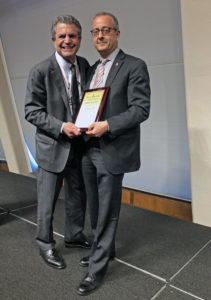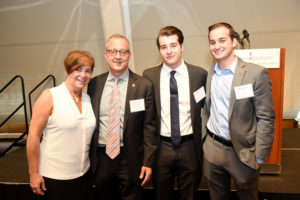This May, Odyssey House President & CEO Dr. Peter Provet was recognized for his leadership in the addiction field at the Mental Health News Education (MHNE) Leadership Awards Reception. Dr. Provet received the Community Service Award. The MHNE Awards honor key leaders from the behavioral health and autism community and their commitment to making a difference in people’s lives.
Dr. Provet was introduced by Dr. Mitchell Rosenthal, president of the Rosenthal Center, and Dr. Provet’s mentor:
I first came to New York in 1967 to work for John Lindsay, to develop treatment programs for what was to become the city’s Addiction Services Agency, Odyssey House was already here. And it is still here today… due in no small measure to one of the outstanding persons we honor tonight.
This surprised me not at all, for Peter Provet, a gifted clinical psychologist, had already nurtured for Phoenix House the nation’s largest treatment program for adolescents. And, as he expanded the capacities of Odyssey House, he has altered and enhanced the troubled and disordered lives of countless men and women.
For Peter is animated by the realization that life is not fair, and those we honor here tonight are engaged in efforts that seek to make life less unfair.
In an era where the dominant theme is “More for me,” they recognize in the lottery of life what we the winners owe the losers. For we who thrive are all beneficiaries of our good fortune. It is luck that has given us the means of our success: our intellect, skill set, energy, drive, imagination, determination, or the circumstances into which we were born.
Few recognize this as much as Peter…who has sought out those others have ignored. He noted early on how few drug-troubled women were in appropriate treatment programs. And today, the Odyssey Family Center, a residential program that accepts pregnant women and mothers with their children, and provides intensive treatment for more than one hundred women and children.
Responding to the needs of the homeless, Peter developed more than four hundred housing units in supportive residences for men and women with mental illness and or former drug abusers in recovery.
And so please welcome a man whose identity is best defined by his good works, the president and CEO of Odyssey House, Dr. Peter Provet.
Dr. Provet
Good evening. Thank you Mitch. It is an honor to receive this award for Community Service, an honor to be introduced by a man I have always admired and am fortunate to call a mentor and a friend, and honored to be with all of you this evening. And thank you Ira and David Minot, publishers of Behavioral Health News and Autism Spectrum News, the Board of Mental Health News Education, and its chair, Debbie Pantin, President & CEO of Outreach, for your support.
As the leader of Odyssey House for 20 years, I have had the privilege of developing and directing programs and services for thousands of men, women, and children who struggle with substance abuse, mental illness, homelessness, and poverty. It is challenging and at times humbling, but over and above any of that, it is inspiring, rewarding, and deeply gratifying.
I am immensely proud of Odyssey House, and the contributions we make to improve the lives of New Yorkers, many of whom were given up on by society, by family, even by themselves.
Addiction is a pernicious disease. It strikes people from all walks of life, exposes abusers to dangers, destroys their work and family lives, and creates havoc in communities. It can be a swift and cruel slide into a life of despair, and increasingly, premature death. Without treatment, people can face insurmountable odds and many just never recover.
The opioid epidemic has now – conservatively – claimed the lives of more than 200,000 Americans. It is a staggering loss of life and potential. The epidemic is being blamed for increased suicide rates, pockets of economic decline, and overwhelming family dysfunction. As a leader of one of the largest publicly-funded treatment agencies, we are on the front lines of this fight. It couldn’t be more serious and there couldn’t be more at stake when so many lives – upwards of 110 a day across the country – are being lost.
But despite the pain and loss, I am optimistic. I know treatment works because I see it every day in our residential and outpatient programs. I know recovery is a sustainable way of life, and I celebrate our clients’ victories – big and small – because we, you and I in this room – are cheerleaders and the mouthpieces for the overlooked, cast aside, underestimated, unwanted.
As I was thinking about what I could share with you as the recipient of this year’s community service award, I got to thinking about what community means in behavioral health and how much that replicates community everywhere. We share a sense of values for others. We believe in investing in people. We juggle ideas and demands with limited resources, we often perform the impossible, and sometimes we fail.
But as with any community – or family – fundamentally founded upon prosocial values, we don’t give up and we come back more resilient.
Here then is BRIEF a list of some of the ways we have gotten stronger:
Substance abuse disorders are no longer seen as moral failure, and treatment is earning respect as a humanistic, mental and physical health process that not only saves lives but puts them back together stronger than before.
Substance abuse is now fully accepted as a chronically relapsing disorder – much like other behavioral health dependent conditions from diabetes to hypertension – that takes time and understanding to alleviate; not punishment and superhuman willpower to conquer.
Substance abusers are also increasingly recognized as the victims of crime and corporate profits. The anger towards the pharmaceutical industry – for its cynical role in facilitating addiction in vulnerable people for profit – is deserved and long overdue. In the treatment field, we hope reparations will be made in the form of increased funding. We’ll see on that one, but controlling the subtle and not so subtle abuse of these companies and holding them accountable for their direct impact in fostering opioid addiction, and its thousands of associated deaths, has just begun.
While substance abuse treatment has been the soul of Odyssey House for over 50 years, housing, especially for homeless people living with mental illness and HIV/AIDS, is in our heart. We now operate 450 units of supportive housing, many in buildings we constructed ourselves with capital from NYS OMH and tax credits.
These buildings stand out for the quality of their architectural design both inside and out, their greenness [Soundview – LEED Silver], the dedication of the staff who work in them, and the dignity they bestow on the lives of the tenants. Small in scale – ranging from 55-65 apartments, shoehorned into abandoned lots or seamlessly constructed mid-block, they now add to the environment of the city and blend in. Much like our tenants.
Blending in, being accepted, even welcomed is what we want for the people we serve. Just a few weeks ago, we presented a treatment facility extension to a skeptical – some would say hostile – community board in the City. The local residents are fed up and want fair share to mean no more programs in their backyard. This we respect. They want to feel safe in their homes and want their streets to be as clean as other affluent parts of the city. They called us in and told us their concerns. They didn’t hold back, it was uncomfortable – until they talked about Odyssey House. How our clients were never out loitering, how we kept our buildings in good shape, how we sponsored and participated in community events, and how we had helped many of their families and friends get help. They didn’t want to support us, but because of our record, they wouldn’t stand in our way.
It was one of the most gratifying experiences of my career as a community leader and gives me hope that if you do the right thing, albeit over-and-over, often with no one looking or even caring, minds can ultimately be changed, and we can all share the benefits.
I am deeply honored to receive this award from my community of peers.
While it is personally rewarding, it is more so as a shared honor with my colleagues at Odyssey House. Let me also thank our entire Board of Trustees, and in particular, Mr. George Rosenfeld, the Board Chairman of Odyssey Foundation, who has led our agency for more than 20 years, throughout giving me encouragement, hope, critical vision, and unswerving commitment to our vital cause.
Finally, thanks and my love to my beautiful family – sons Jeremy, Jack and Sam, their mother, Anne, my brother John, cousins Melissa and Jim, and my lovely partner, Marcy. Thank you all for your support, encouragement, and love.
Also recognized were Steve Coe, CEO of Community Access; Daniel Etra, CEO, and Eran Rosenthal, President and COO, of Rethink Autism; and Joyce Wale, Regional Executive Director of United Healthcare. Click here to check out more photos from the reception.



